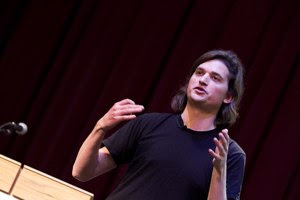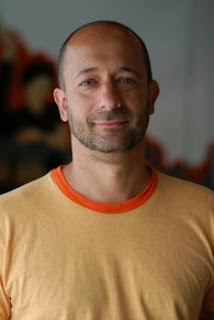 Hit play and the video starts with Andy walking down an alley singing. After a few seconds, two options appear on the screen and you select whether Andy will bump into some boxes or get dumped by bikers. Choose quickly, because you only have a few seconds. Like the choose-your-own adventure books you used to read, each choice sets off a different story line. One story line includes a cameo by Dwight from the Office. And like a choose-your-own adventure book, you will probably want to see every outcome, watching the video over and over until the song is stuck in your head. They even let you choose whether to end the song a cappella or with the full band.
Hit play and the video starts with Andy walking down an alley singing. After a few seconds, two options appear on the screen and you select whether Andy will bump into some boxes or get dumped by bikers. Choose quickly, because you only have a few seconds. Like the choose-your-own adventure books you used to read, each choice sets off a different story line. One story line includes a cameo by Dwight from the Office. And like a choose-your-own adventure book, you will probably want to see every outcome, watching the video over and over until the song is stuck in your head. They even let you choose whether to end the song a cappella or with the full band.  Like Guitar Hero and Glee, the video for “Keep Your Head Up” is another great example of the increasing crossover between video, music and games in the modern consumer media age. This crossover leads to greater engagement as sight, sound and decision-making processes are all taken over. Greater engagement leads to more ad revenue opportunities.
Like Guitar Hero and Glee, the video for “Keep Your Head Up” is another great example of the increasing crossover between video, music and games in the modern consumer media age. This crossover leads to greater engagement as sight, sound and decision-making processes are all taken over. Greater engagement leads to more ad revenue opportunities. For starters, most people watch the video (and thus the ads) several times. Because they are focusing on the video and expecting to take an action, they are more likely to read ads that pop up. But imagine if you can use a similar technology to integrate ads into the video. What if I could click on Andy's T-shirt and buy it, or enter the online store of a poster he walks by?
 Tracking the choices of consumers is valuable information for film makers and video sites who can see what works best, what compels a user to pick one option over another, and whether there is a correlation between position of choice on screen and choice made. We can figure out, for example, that ads placed on the right side of a screen will get the most attention.
Tracking the choices of consumers is valuable information for film makers and video sites who can see what works best, what compels a user to pick one option over another, and whether there is a correlation between position of choice on screen and choice made. We can figure out, for example, that ads placed on the right side of a screen will get the most attention. The interactive music video is a collaboration between technology company Interlude, record label S-Curve, and music video distribution hub Vevo. Interlude, an Israeli company founded by popular musician Yoni Block, develops the platform that enables video makers to add this extra layer of engagement. There are other companies that offer a similar technology, but Interlude is unique in that if offers an interactive experience that is seamless: the content doesn't pause as it waits for you to make your decision. S-Curve is a record label founded by former Columbia Records president Steve Greenburg. A small company focused heavily on innovation, S-Curve discovers and fosters new music-related technologies then uses them with their artists. They often take an equity stake in the technology companies to help them crack into a crowded music industry.
Interactive videos are certainly enjoyable, but detractors argue it's not cost effective. First look technology never is. The model needs to be proven, then the market responds with more companies eager to capitalize on higher revenue margins, which should lead to cheaper production costs. Still, big bands who can afford to should look more closely into interactive videos, like Arcade Fire did when creating their Google-assisted HTML-5 music video experience The Wilderness Downtown.
 In case you're wondering which official video will be released to other content channels like television and Metacafe, Vevo is tracking which “routes” made through the video are the most popular and plan to release this version as “Official”.
In case you're wondering which official video will be released to other content channels like television and Metacafe, Vevo is tracking which “routes” made through the video are the most popular and plan to release this version as “Official”.









